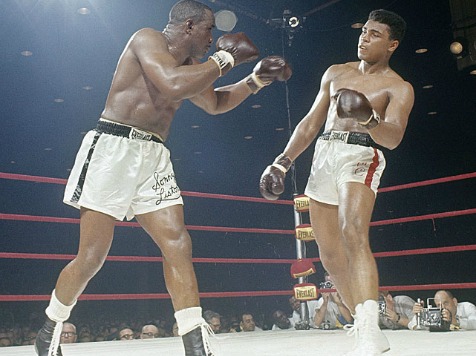Was the fight of the century the fix of the century?
Fifty years ago today, Cassius Clay, as Muhammad Ali was then known, and Sonny Liston, the undisputed heavyweight champion of the world, squared off in Miami Beach. Joe Louis called Clay’s victory “probably the biggest upset in the history of boxing.” Liston, Ali, and boxing would never be the same.
Ali, who had won gold as a light-heavyweight Olympian in 1960, was known more for his bark than his bite then. Less than a week before the fight, he had mugged it up for pictures with The Beatles, the other twentysomething sensations of 1964. He mocked Liston’s “big bear” nickname by calling his opponent a “big, ugly bear” in the press. Down on the canvas against Brit Henry Cooper in his previous outing, Ali figured an easy out for Liston. Oddsmakers pegged the fast-talking Kentuckian as a 7-1 underdog.
And why wouldn’t gamblers like Sonny Liston? St. Louis mobsters owned a stake in the fighter from the outset of his professional career. Liston, who served prison time for a series of muggings in the early 1950s, regularly associated with underworld figures. Prior to Liston obliterating Floyd Patterson in the first round of their 1962 fight, the NAACP, President Kennedy, and others urged the champion not to fight the challenger because of his unsavory history and ties. Perhaps more because of his reputation in the ring than outside of it, Patterson ducked Liston until he could duck him no more. Intimidating, mean, and powerful, Sonny Liston was the Mike Tyson of his day, winning fights during the stare down and sending grown men into fearful fits.
So when Liston refused to answer the bell for the seventh round of his February 25, 1965 bout against Cassius Clay, fans, journalists, and politicians suspected another sordid story for the sweet science. But Florida’s attorney general, and a U.S. Senate subcommittee, found no evidence of a rigged outcome, and since questions surrounding Liston and Ali generally focus on their 1965 rematch, when Liston hit the canvass after a “phantom punch” in Lewiston, Maine, fight aficionados generally fixate on their second match when alleging a fix.
But the Washington Times has uncovered government documents indicating that the FBI, at least, suspected something amiss with Muhammad Ali initially capturing the heavyweight crown. The most compelling evidence unearthed by the Times involves the interactions of two gamblers, Ash Resnick of Las Vegas and Barnett Magids of Houston. The former had once introduced the latter to Liston at the Thunderbird Casino.
The Times follows a series of FBI reports that depict Magids as seeking information on the Liston-Ali bout, and Resnick warning him not to bet on it after earlier assessing the match as a cakewalk for Liston. “A week later, there was an article in Sports Illustrated writing up Resnick as a big loser because of his backing of Liston,” an FBI report explained of the aftermath of Liston-Clay. “Later people ‘in the know’ in Las Vegas told Magids that Resnick and Liston both reportedly made over $1 million betting against Liston on the fight and that the magazine article was a cover for this.”
The other major piece of mythology surrounding Liston-Ali I, however, argues against a fix. Past the midway point of the fight, a partially blinded Ali kept Liston at bay with one extended glove as he rubbed his eyes with his other glove. A benign interpretation posits that liniment on Liston’s shoulder, coagulant from the cut under Liston’s eye, or that some unknown substance from Clay cornerman Angelo Dundee had made its way into Ali’s eyes. A more ominous theory holds that Liston had laced his gloves with a foreign substance to impair his opponent’s vision. Whatever the cause, the impairment resulted in a dominant fifth round for the champ, who stalked a blinking Cassius Clay for three minutes. But after three more minutes of action, the fight would end anticlimactically with Liston parked on his stool complaining of a sore shoulder.
Why would Liston fix a fight in which he allegedly cheated to get a win? Clearly, some within the FBI believe the champ threw the fight.
“[Ash Resnick] is the fix point of two heavyweight title fights — both Liston,” informs one of the unearthed FBI reports. “[H]e had always been and will continue to be a corruption source for professional sports until he is stopped.”
The victory by Ali, whose career progressed to feature remarkable wins over George Foreman, Joe Frazier, and Ken Norton, doesn’t seem as shocking in retrospect as it did fifty years ago today. Sonny Liston, who by all accounts hated needles, was strangely found dead of an injected heroin overdose in 1970. His death, like his most famous fight, remains shrouded in mystery.

COMMENTS
Please let us know if you're having issues with commenting.